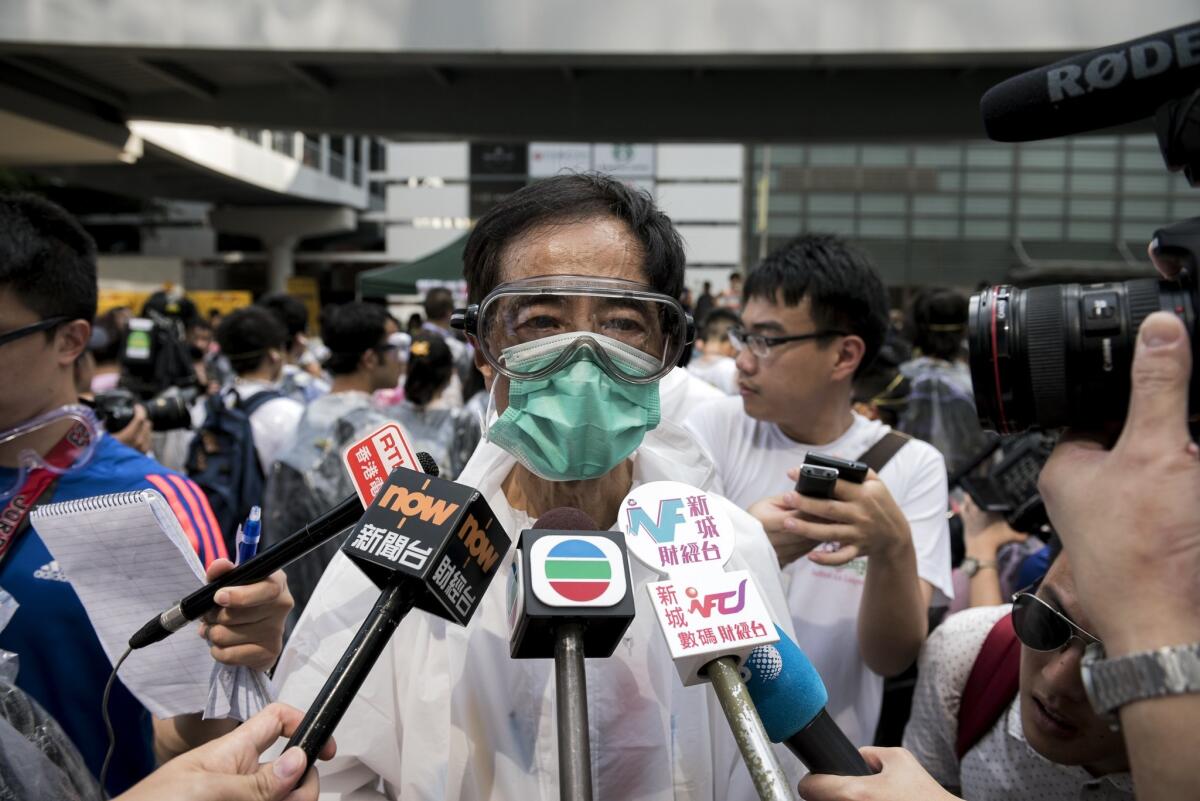Hong Kong democracy stalwart says ‘foreign forces’ not behind protests

China’s attempt to blame U.S. and other “foreign forces” for Hong Kong’s protests is merely a “convenient excuse” for Beijing to cover its shame for not granting the territory true democracy as it once promised, said Martin Lee, founding chairman of Hong Kong’s Democratic Party.
With street sit-ins entering their second month and no resolution in sight, Lee, 76, said Tuesday that responsibility for ending the ongoing protests rests on the shoulders of Chinese President Xi Jinping, who recently has emphasized the necessity of the “rule of law.”
Lee, founder of one of Hong Kong’s largest political parties, has been singled out by China’s Communist Party for allegedly inviting outside interference in the territory’s affairs. In April, the U.S. Congress revived an annual report on political developments in Hong Kong following a plea by Lee and former Chief Secretary Anson Chan. They have since been condemned in China’s state-run media as “betraying” Hong Kong with their move.
Protesters in Hong Kong, a former British territory that returned to Chinese rule in 1997 under a framework known as “one country, two systems,” took to the streets in late September to denounce rules laid out by Beijing for the city’s chief executive election in 2017. The rules would limit candidates to two or three people approved by a special committee expected to be packed with pro-establishment figures.
Protesters say that is tantamount to “fake democracy” and contravenes promises made with the 1997 handover. They are pressing for a more open, public nominations system.
A two-hour dialogue between protest leaders and five Hong Kong government officials last week yielded little common ground. The session was first of what is expected to be several rounds of talks aimed at resolving the political crisis, but a second session has yet to be scheduled.
In an interview with The Times, Lee said he did travel overseas frequently to met with government officials, lawmakers, the media and Chinese communities. But he said that his message has always been defending Hong Kong’s core values and that he never accepts financial support from abroad.
“I never ask for money,” said Lee, “and even if they offer, which they haven’t, I won’t touch it. Because I know, once I touch it, they will use it against us.”
Lee denied allegations that protesters wanted to separate Hong Kong from mainland China. Rather, he said, demonstrators only want to hold Beijing to its promises made under the Basic Law, the legal framework of the 1997 handover, which promised Hong Kong a high degree of political autonomy for 50 years.
“We have never asked for independence. We have always accepted the ‘one country, two systems’ policy,” said Lee. “We just want to hold China accountable for its policy; we have never asked for more.”
“The Basic Law is China’s policy in Hong Kong and … China promised us, 10 years after the handover, Hong Kong could have universal suffrage for the chief executive election. That includes not only the right [of every citizen] to vote, but also the right for other people to stand for elections,” said Lee. “But they have postponed it twice, and now block the way to true democracy.”
Lee said he clearly remembered the day in 1987 when he first met Deng Xiaoping, China’s paramount leader at the time. It was April 26, and Lee was then a Hong Kong lawmaker serving on a committee drafting the Basic Law.
Deng’s words, he said, were clear. “He famously said one sentence. He said if 50 years [of a high degree of autonomy] should prove not to be enough, you may have another 50.”
What Deng meant, Lee said, was if mainland China hadn’t “caught up” with Hong Kong by then, China would still want the territory to maintain the freedoms inherited from the British.
“Deng Xiaoping’s blueprint is not just for Hong Kong, Macao and Taiwan, but I believe, for the whole of China,” said Lee. However, he said that “China has not been sticking to Deng Xiaoping’s plan to keep Hong Kong truly a highly autonomous area.”
Pointing to a key Communist Party political gathering last week that emphasized the “rule of law,” Lee added that if Xi was sincere, he would ask the standing committee of the National People’s Congress, which issued the election framework, to revisit its decision.
“If he would do that, how would the world receive that decision? The whole world would approve,” said Lee. “They would say, ‘OK, from now on, China is in a different position, a Chinese leader can be trusted.’”
In the meantime, Lee appealed publicly to his generation and parents of protesting students to “not persuade the students protesters to go home.”
Hong Kong’s pro-democracy protests have been characterized by a sharp generational divide, with many in their 40s and 50s opposing their children’s involvement as wrongheaded or futile.
“There are two movements, one is the grown-ups’ movement -- we use our way to deal with it, and that’s always fighting for democracy within ‘the cage’ -- that’s the Joint Declaration and the Basic Law. This is our world,” Lee said. “But in the younger generation’s world, where they are for the first time fighting for democracy, this is their way.”
Hui is a special correspondent.
More to Read
Sign up for Essential California
The most important California stories and recommendations in your inbox every morning.
You may occasionally receive promotional content from the Los Angeles Times.










